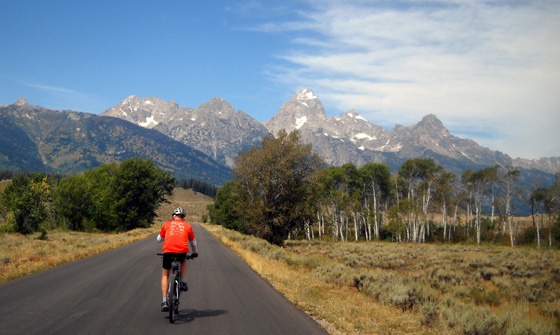(Continued from the last page.)Driving through remote wilderness
areas in northern Canada and Alaska is a type of adventure that Jim and
I love but we still took some safety precautions to lessen the risk of
mechanical breakdowns, running out of fuel, and knowing what road
conditions were up ahead.
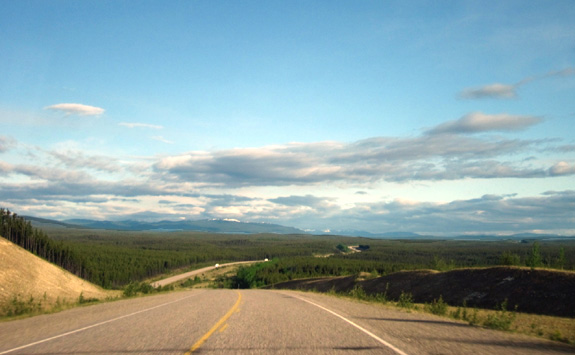
Trees, mountains, and sky as far
as the eye can see on the Alaska Hwy. in southern Yukon Territory
(6-12-12)
We also had a bit of a safety net so we could stay in contact with
civilization if we needed help.
This page focuses on cell phone coverage, internet reception,
emergency radios, and emergency road services. It also includes some
information about border crossings.
These tips apply whether you're driving just a passenger vehicle
or taking an RV to Alaska.
COMMUNICATIONS
Cell phone coverage and internet reception vary more widely
throughout Alaska and northern Canada than down in the Lower 48. Check
with your phone carrier before traveling to see where coverage is
offered and whether there are additional costs to use your phone and/or
get on the internet.
With Verizon we usually had a signal in populated areas of Alberta,
British Columbia, and Alaska but none in remote areas. The only places
we had a signal in the Yukon were in the towns of Watson Lake and
Whitehorse. Otherwise our phones said "searching for service."
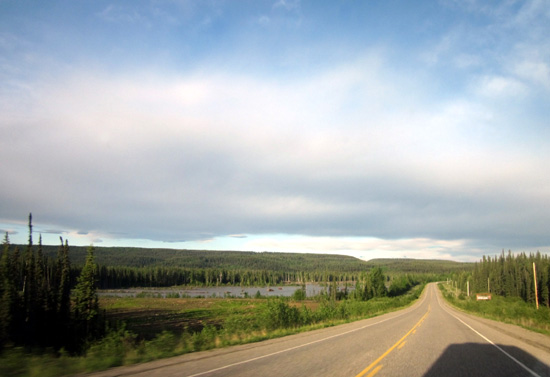
Early morning in the southern
Yukon; this is one of many lakes along the Alaska Hwy. (6-12-12)
We didn't use our phones much or at all in Canada, even in the
populated areas, because
of the cost.
On the way up to Alaska we paid Verizon a prorated rate equal to $20/month so
we could use our cell phones in Canada. The alternative was 59 cents/minute,
which would add up fast.
Because we used our phones so little going northbound in Canada we didn't
initiate that plan on the return. We figured we could live without our
phones for a week in transit and just pay the high per-minute cost if we
had an emergency.
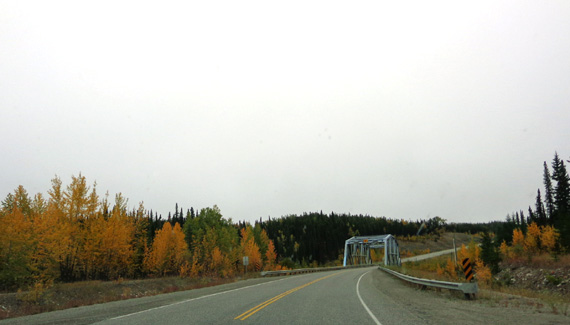
There was a lot more leaf color along
the Alaska Hwy. in the Yukon on the return trip. (9-8-12)
Our standard Verizon plan worked fine in Alaska, although coverage was
unpredictable.
I had a stronger signal from the tops of 5,000-foot
mountains halfway inside remote Denali National Park than I did at JBER
(Joint Base Elmendorf-Richardson) in northern Anchorage, a city of about
300,000 people! Sometimes I run into that phenomenon in the Lower 48 but
not as often.
Our personal Verizon MiFi internet card was a different story.
The
upgrade to use it outside the USA is so high that we simply didn't use
it at all during the approximate two weeks up and one week back
through Canada. We made sure all secure transactions, like scheduling
bills to be paid, were done before we crossed into Canada each time.
While in Canada, we relied on public WiFi at a couple campgrounds to get our
e-mail and keep up with the news (TV was very sporadic, too, since we
don't have satellite).
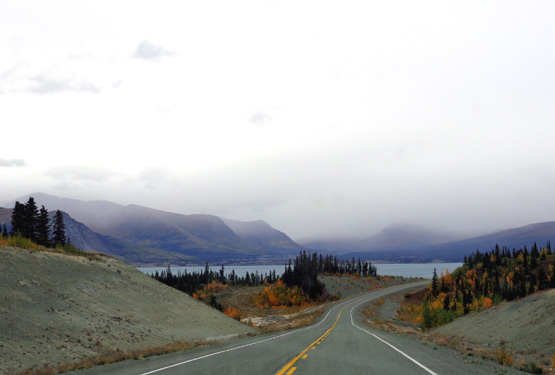
We had no cell or internet
service at our campground near remote Kluane Lake in the Yukon. (-9-7-12)
Our secure MiFi card worked as sporadically in Alaska as our cell
phones since it's
dependent on how strong our cell phone signal is. The few times we had
public WiFi in campgrounds in Alaska we used it for anything online that
didn't have to be secure.
Jim also took his CB and ham radios along on the trip in case we
needed them in an emergency, such as a mechanical breakdown in
the middle of nowhere. He never did need to use them but we felt safer
having them available.
If you have some type of radio for emergencies, take it with you. If
not, do some research and consider buying one.
ERS
We also purchased emergency roadside service from Good Sam that is
valid in both the U.S. (including Alaska) and Canada.
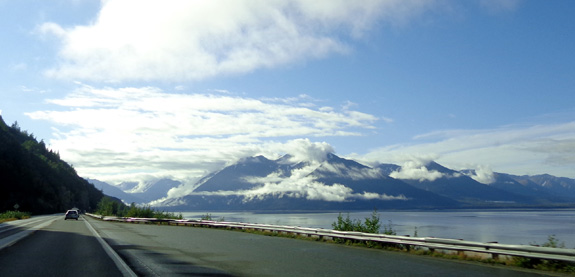
This is one of the few places we
went in Alaska where ERS would be relatively easy --
the well-traveled Stewart Hwy.
south of Anchorage on Turnagain Arm. (8-25-12)
We didn't need to use it, either, but it gave us some peace of mind knowing we
had it. Towing a truck, camper, or both a couple hundred miles is
very, very expensive in the Far North -- if you can even find
someone to rescue you out in the middle of nowhere.
We recommend you add that to your lengthening list of Things to
Research Before a Trip to Alaska.
BORDER CROSSINGS
If you drive to and from Alaska from the Lower 48 you will have a
minimum of four border crossings -- two into Canada, two into the
U.S.
If you do a side trip by road to Haines, Skagway, or Hyder,
AK you'll have even more border crossings because you have to go through
British Columbia to reach each of those interesting towns. We didn't see
any of them on this trip but we might visit one or more of them next
time.
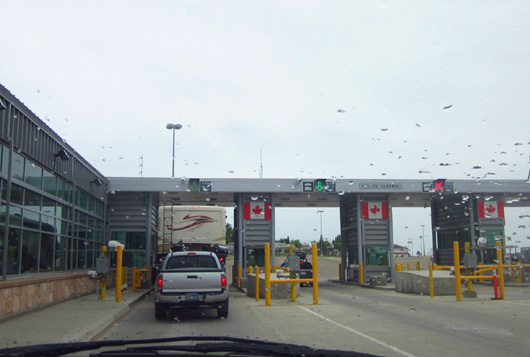
Our first border crossing going
northbound was at Coutts, Alberta. (6-4-12)
We were a bit paranoid about our first border crossing at Coutts, AB
back in early June. Well before we left Virginia we spent a lot of
time doing internet research re:
the requirements, limits, and prohibitions concerning both Canadian and
U.S. border policies.
Beware: the rules not only vary from country to country,
they also change from time to time.
Do your homework so you know the current regulations about
identification required (passport vs. just driver's license), vehicle
insurance/licensing, firearms regulations, amounts of cash,
prescription drugs, alcohol, and other items you can take across the
border, what fruits, vegetables, and meat/seafood is allowed from the
country you just left, etc.
If you have one or more pets, find out what paperwork may be required
to get them across the border with you.
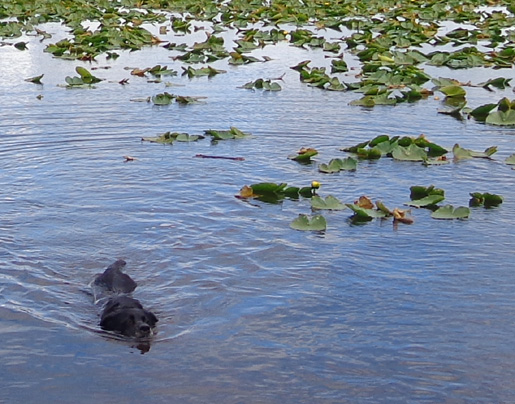
That's our boy! Cody-the-Lab
enjoys a swim through the water lilies at
Johnson Lake across from our
campground in Kasilof, AK. (7-13-12)
Even more nerve-wracking than all the regulations, however, is the
plain fact that any kind of border crossing is a crapshoot.
At highway borders you can't accurately predict whether your vehicle is going to be
chosen at random for a thorough search or whether you'll simply be waved
through after half a dozen standard questions.
We've seen big, shiny
rigs chosen for searches as well as small, beat-up ones. From what we've heard it
often comes down to random bad luck -- for example, it's a slow day when
you're going through and agents need to look busy, or there's a border-agent-in-training
who needs some practice finding all the
places people can hide forbidden items in RVs.
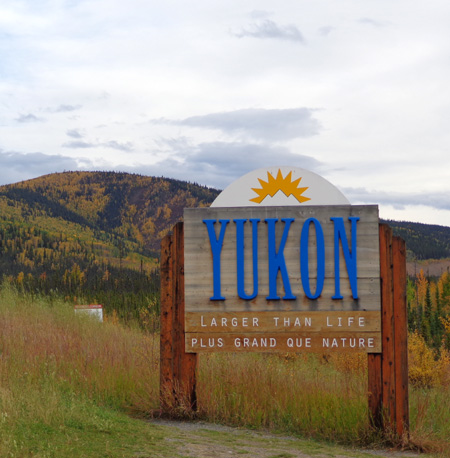
Across the Canadian border on our way back
(9-6-12)
Bigger issues that can trigger a search are "wrong" answers,
something about you or your RV that looks or sounds suspicious, and
criminal profiling. Profiling doesn't bother us in the least because it
most likely works to our advantage -- two Olde Pharts and a dog in a nice-looking rig.
I seriously doubt we fit any smuggler profile!
Answer the questions you're asked briefly and honestly. Be polite.
Don't complain about the wait or the process. And for goodness sake,
don't make jokes. These folks take their job
even more seriously than the TSA and they can make your life truly
miserable.
You're asking for trouble if you withhold information, such as not
declaring a firearm or forbidden fruit (literally or figuratively). You
may get through customs OK but if you're searched and something turns up that is
prohibited it could be confiscated at minimum or you could be fined,
detained, or turned around at maximum.
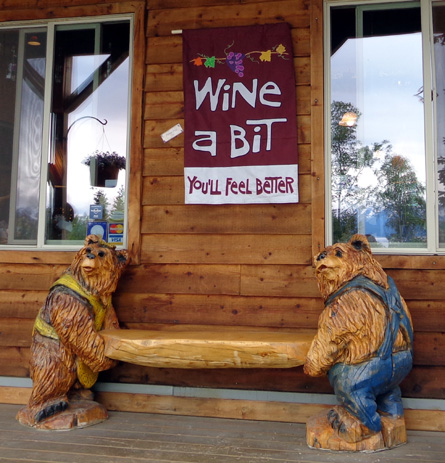
Above and below: tasting room at
the Bear Creek Winery in Homer, AK (7-14-12)
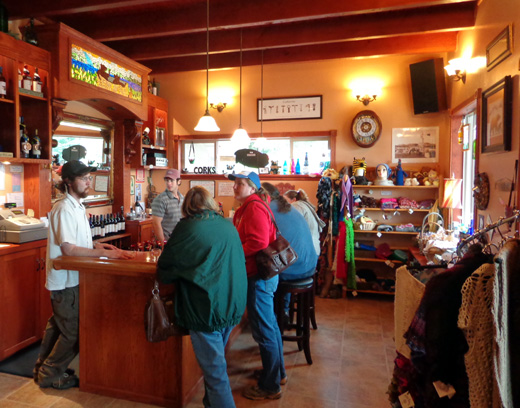
We knew we were within the law in all cases except perhaps some of
the food we were carrying.
Citrus is frequently confiscated so we always ate our supply of
tangerines or grapefruit before crossing a border. We weren't so sure
about the other produce and poultry/meat/seafood we had. When asked, we
told them what we had and our answers never raised any alarms.
Our main concern was the hassle of having the truck and camper
searched and having to put everything back in order again. We've heard
of vehicles being left a total wreck inside after the agents get done
going through all the cupboards, drawers, closets, and storage areas.
Apparently they don't put things back the way they find them!
Fortunately, in all four of our border crossings during this trip we
had no problems whatsoever. Once we got to each border agent we were
waved through in only a couple minutes. No searches, no hassles,
"Have-a-great-time-while-you're-here!"
Our waits in line ranged from one minute to almost one hour,
however.
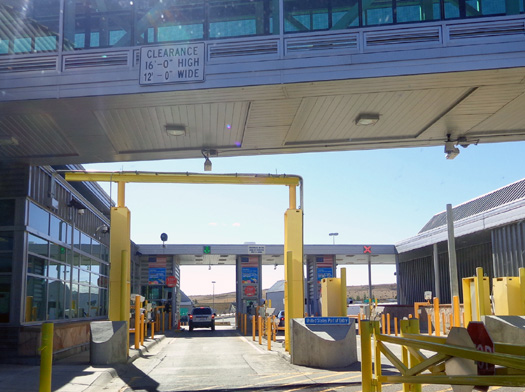
We had a very short wait at the
Sweet Grass, MT border crossing on our way back. (9-12-12)
Each agent checked our passports first, then asked where we were
coming from, where we were going, how long we'd be in their country, and
whether we had any firearms. We didn't take the weapon we usually take
with us through the Lower 48. We always declared the bear spray and no
one asked to see the canisters. We've since heard from more frequent Alaska
travelers than us that bear spray may be confiscated, too.
After that, the questions varied from agent to agent.
Three of the four agents asked about the fruits, vegetables, and
meat/seafood we were carrying. All were OK, including the freshly-caught salmon
we bought at Safeway in Seward and froze. The U.S. agent at Sweet Grass,
MT asked us about it on our way back and seemed interested only in
whether we'd caught it ourselves. Not sure what would have happened if
we'd said yes . . .
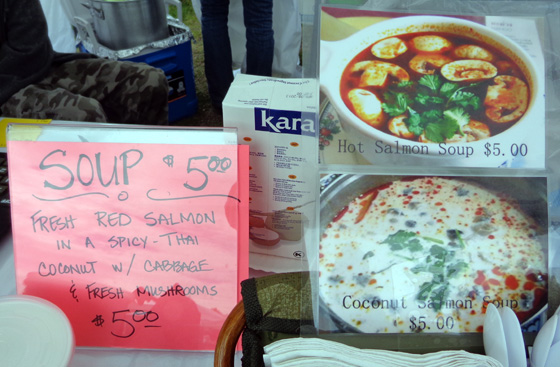
One of the best meals I had in
Alaska was this Thai-flavored salmon soup from a booth at the farmers'
market in Homer; I ate a bowl of it
there and took another one back to the camper for another meal. (7-14-12)
Two agents wanted to know if we had more than $5,000 cash with us. Good
thing it was Jim in the driver's seat giving the answers
because I had to stifle a laugh the first time we heard that question.
$5,000 in cash?? I wish! We always charge everything we can
and carry very little cash, even in Canada.
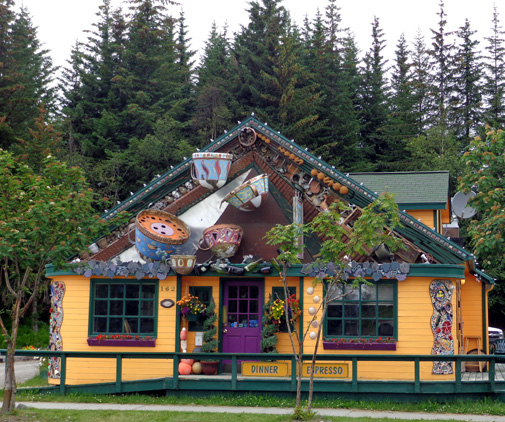
We didn't eat at this little restaurant in Homer; I
just liked the funky decor. (7-14-12)
Only one agent asked about the amount of alcohol we had on board. I
think that was at the Coutts, AB crossing into Canada on our way to Alaska.
Only one agent asked whether we had a pet and wanted to see Cody's
paperwork. That was at the Canadian border near Beaver Lodge, YT on our
return to the Lower 48.
No one ever asked to see our vehicle registrations or proof of
insurance or asked about prescription or other drugs. We could just as
easily been asked for that information, too.
We're not sure how duty fees work (been too long since our previous
trips out of the USA) but we never had any questions about purchases we
made that might have been subject to taxes.
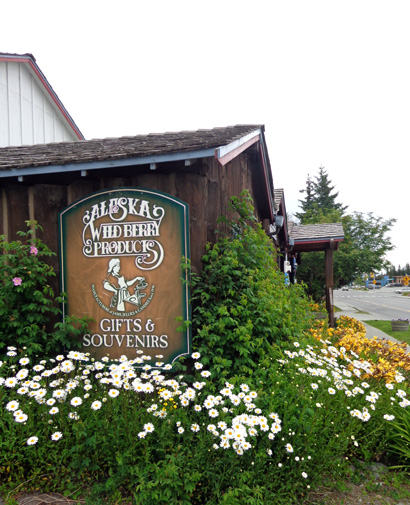
One of many gift shops in Homer; berries grow
prolifically in Alaska. (7-14-12)
We had all of the pertinent IDs, paperwork, bear spray, and
prescription drugs in the cab of the truck with us in case we needed to show them
to the agents. That helped speed up the process. If I'd had to go get
Cody's paperwork in the camper, e.g., we might have triggered a search
at that crossing. Instead, we just handed them over to the agent that
requested them. (Yes, he read them.)
After the first border crossing we never worried near as much about another one.
We weren't totally nonchalant, just not paranoid any more.
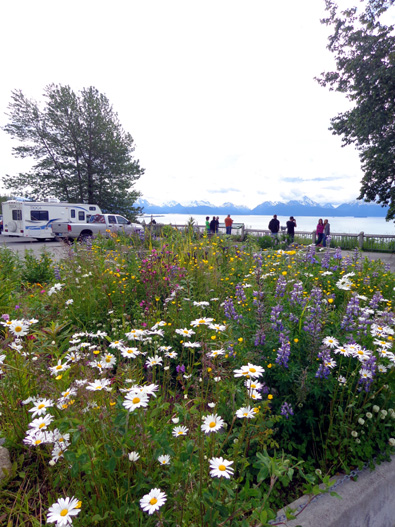
Travelers admire the scenery,
flowers, and bald eagles at the rest area
on the Sterling Hwy. overlooking Homer, AK and Kachemak Bay. (7-14-12)
The best advice I can give you for
border crossings is to do your homework thoroughly and know the
current regulations for each country -- then be compliant and don't try
to smuggle something in that is verboten.
Oh, and be sure your underwear drawer is orderly in case you're one
of the unlucky folks whose RV gets searched. <wink>
Continued on the next page: what we might do differently
on our next trip to Alaska
Happy trails,
Sue
"Runtrails & Company" - Sue Norwood, Jim O'Neil,
and Cody the ultra Lab
Previous
Next
© 2012 Sue Norwood and Jim O'Neil
